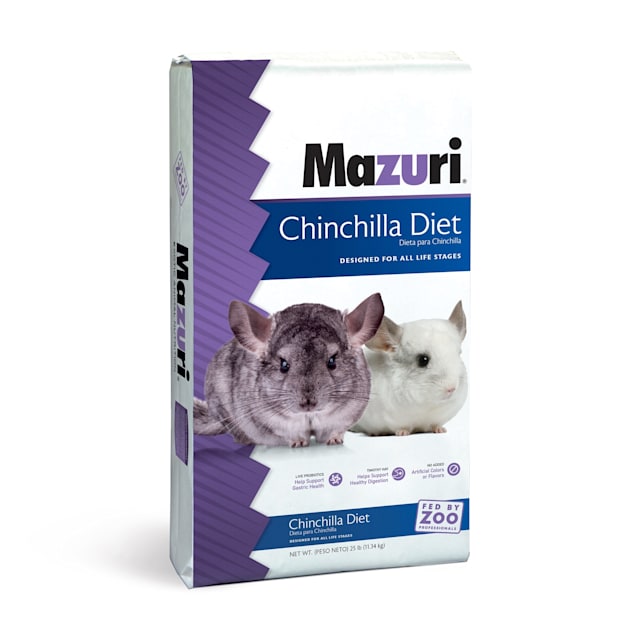Mazuri Chinchilla Diet Food, 25 lbs.
Description
Chinchillas enjoy Mazuri Chinchilla Food! They love it because it smells and tastes oh so good - you love it because it keeps them healthy and happy at any life stage, with the balanced chinchilla nutrition they need. Our fresh pellets are made with multiple fiber sources including timothy hay, plus flaxseed for Omega-3 fatty acids, and probiotics for gastrointestinal health.
- - Sweet smell - highly palatable
- - Contains live probiotics to support gastrointestinal health
- - Contains flaxseed - a source of omega-3 fatty acids
- - Contains multiple fiber sources, including timothy hay to help support healthy digestion
- - Nutritionally complete - No supplementation required
- - No artificial colors or flavors
Please note that the product information displayed is provided by manufacturers, suppliers and other third parties and is not independently verified by Petco.
Specifications
| SKU | 3821277 |
|---|---|
| Lifestage | All Lifestages |
| Primary Flavor | Alfalfa |
| Primary Brand | Mazuri |
| Days to Ship | Ships Next Business Day |
| Weight | 25 LBS |
| Grain Free | No |
|---|---|
| Personalized Item flag | No |
| Primary Flavor | Alfalfa |
| Lifestage | All Lifestages |
| Length | 13.5 IN |
|---|---|
| Height | 24 IN |
| Width | 3.5 IN |
Dehydrated Alfalfa Meal, Dehulled Soybean Meal, Wheat Middlings, Ground Timothy Hay, Ground Soybean Hulls, Ground Oats, Dried Plain Beet Pulp, Ground Flaxseed, Cane Molasses, Dicalcium Phosphate, Wheat Germ, Soybean Oil, Dried Whey, Salt, DL-Methionine, Calcium Carbonate, Dried Lactobacillus acidophilus Fermentation Product, Dried Lactobacillus casei Fermentation Product, Choline Chloride, Dried Bifidobacterium thermophilum Fermentation Product, Pyridoxine Hydrochloride, Dried Enterococcus faecium Fermentation Product, Folic Acidd-Alpha Tocopheryl Acetate (Vitamin E), L-Ascorbyl-2-Polyphosphate (Vitamin C), Vitamin A Acetate, Magnesium Oxide, Cholecalciferol (Vitamin D3), Manganous Oxide, Zinc Oxide, Calcium Pantothenate, Ferrous Carbonate, Copper Sulfate, Nicotinic Acid, Vitamin B12 Supplement, Riboflavin Supplement, Zinc Sulfate, Calcium Iodate, Sodium Selenite, Cobalt Carbonate.
Crude protein not less than 20.0%, Crude fat not less than 3.0%, Crude fiber not more than 18.0%, Moisture not more than 12.0%, Ash not more than 8.5%, Calcium not less than 0.75%.
Adult Chinchillas will eat approximately 20 grams (2 tablespoons) of pellets per day with an unlimited amount of good quality grass or hay. Juveniles and lactating females should have unlimited pellets per day. Supplemental vegetables and fruits are not required in the diet, but if offered should be limited to less than 10% of the total diet and treats offered at less than 2% of total diet.
Reviews
Rating Snapshot
Review this Product
Customer Images
Filter Reviews
70 Ratings-Only Reviews
The perfect chinchilla food!
Originally posted on mazuri.com
My chinchilla loves his Mazuri Chinchilla food
Originally posted on mazuri.com
Mazuri Chinchilla Diet
Originally posted on mazuri.com
Mazuri Chinchilla Diet
Originally posted on mazuri.com
A good, healthy chinchilla food
Originally posted on mazuri.com
Buy bulk and save $$$$, quality product
Originally posted on mazuri.com
Good for all ages
Originally posted on mazuri.com
Best chinchilla food
Originally posted on mazuri.com

